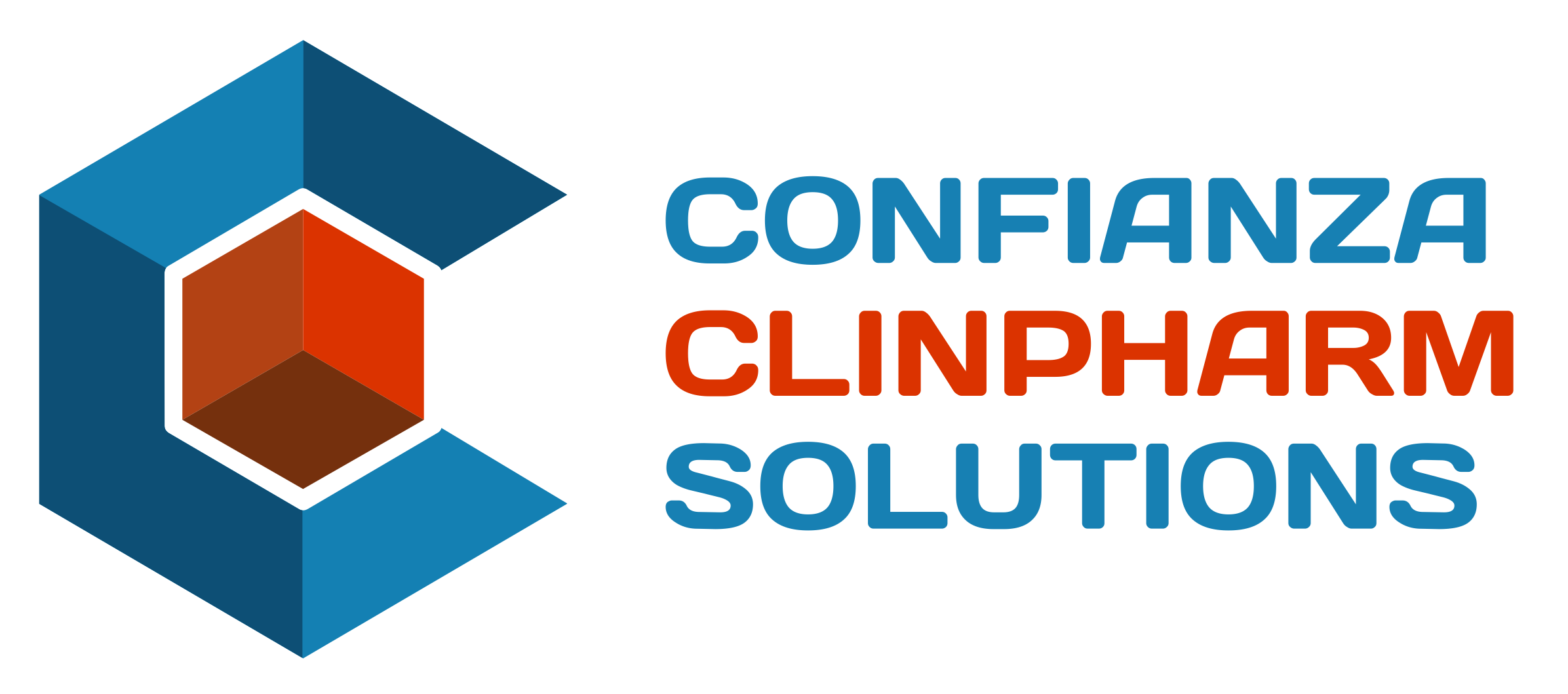
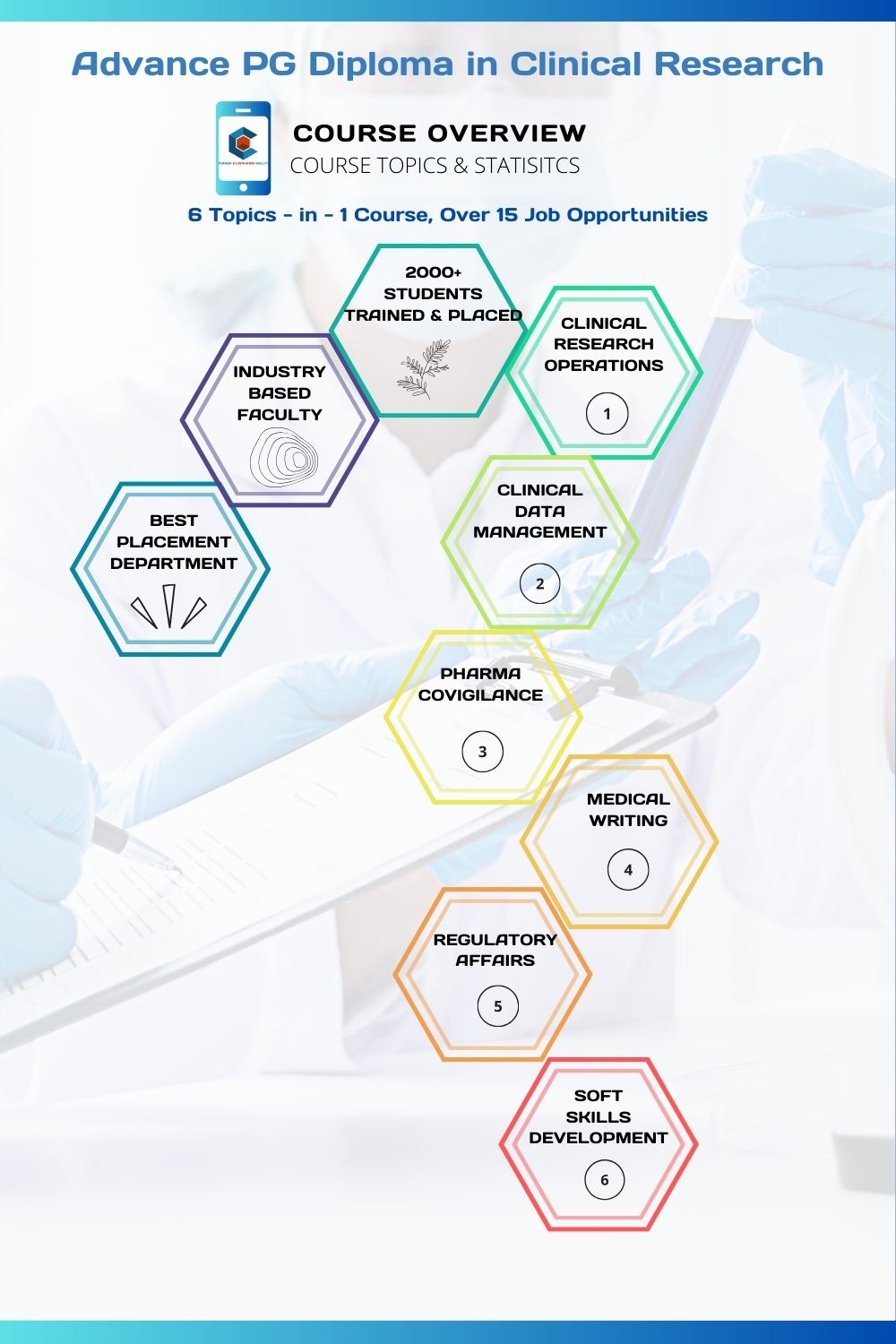
CLINICAL RESEARCH OPERATIONS, CLINICAL DATA MANAGEMENT, PHARMACOVIGILANCE, REGULATORY AFFAIRS & MEDICAL WRITING
Lets first know what is Clinical Research?
Clinical research involves the systematic investigation of new medical treatments, drugs, devices, and procedures to evaluate their safety, efficacy, and potential benefits for patients. It encompasses a wide range of activities, including designing and conducting clinical trials, collecting and analyzing data, and interpreting results. The primary goal of clinical research is to generate evidence-based knowledge that informs medical practice, advances scientific understanding, and improves patient outcomes.
The field of clinical research is experiencing rapid growth and evolution due to several factors. First and foremost, the increasing prevalence of chronic and complex diseases, coupled with rising healthcare costs, underscores the urgent need for innovative and effective treatments. This demand for new therapies drives investment in research and development across the pharmaceutical, biotechnology, and medical device industries. Secondly, the globalization of clinical trials, facilitated by international collaborations and harmonized regulatory frameworks, expands access to diverse patient populations and accelerates the pace of medical innovation.
As the importance of evidence-based medicine continues to grow, so does the demand for skilled professionals in clinical research. Careers in this field span a wide range of disciplines, including clinical trial management, regulatory affairs, data science, biostatistics, and medical writing.

Secondly, let’s know about Career prospects and job opportunities in clinical research
- Clinical Research Coordinator: Overseeing the day-to-day operations of clinical trials, including participant recruitment, data collection, and regulatory compliance.
- Clinical Research Associate (CRA): Monitoring clinical trials, ensuring adherence to protocols, and maintaining communication between sponsors, investigators, and study sites.
- Data Manager: Managing and analyzing clinical trial data, ensuring its accuracy, completeness, and integrity throughout the study.
- Regulatory Affairs Specialist: Ensuring compliance with regulatory requirements, preparing and submitting documents for approvals, and liaising with regulatory agencies.
- Quality Assurance Auditor: Conducting audits to ensure compliance with regulations, protocols, and standard operating procedures in clinical trial conduct.
- Medical Writer: Preparing regulatory documents, study protocols, clinical study reports, and other scientific documents for publication and submission to regulatory authorities.
- Clinical Project Manager: Overseeing multiple clinical trials, managing timelines, budgets, and resources, and ensuring the successful execution of clinical research projects.
- Biostatistician: Analyzing clinical trial data using statistical methods, interpreting results, and contributing to the design and analysis of clinical studies.
- Pharmacovigilance Specialist: Monitoring and evaluating the safety of investigational drugs and medical products throughout their lifecycle, including adverse event reporting and risk management.
- Clinical Research Educator/Trainer: Providing training and education to clinical research professionals on regulations, best practices, and industry standards.
These roles span across
- pharmaceutical companies,
- contract research organizations (CROs),
- academic institutions, government agencies, and
- healthcare organizations,
offering diverse career paths and opportunities for growth in the field of clinical research.
Now Lets Look at the Course curriculum
Module #1
Clinical Research/Trials Operations
1️⃣ Clinical Research/Trials Operations
The clinical research course curriculum is designed to provide students with a comprehensive understanding of the principles, methodologies, and regulations governing clinical trials and research studies.
The curriculum typically covers a range of topics essential for conducting clinical research ethically and effectively. These include an overview of the drug development process, Good Clinical Practice (GCP) guidelines, ethical considerations in research, study design and protocol development, data collection and management techniques, regulatory requirements and submissions, safety monitoring and adverse event reporting, and the role of institutional review boards (IRBs) and ethics committees.
- ICH-GCP Guidelines
- New Drug & Clinical Trials Rules
- TMF/eTMF
2️⃣ Clinical Data Management
The curriculum for a clinical data management course is designed to equip students with the knowledge and skills necessary to effectively manage and analyze data generated during clinical trials.
The course typically covers foundational concepts in clinical research methodologies, regulatory guidelines, and data management principles. It includes hands-on training in data entry, cleaning, validation, and database design using industry-standard software tools such as Electronic Data Capture (EDC) systems.
Students also learn about the importance of data quality assurance, privacy, and security measures to ensure compliance with regulatory requirements.
- Introduction to CDM & Process flow of CDM
- Data entry & Database
- Data review & Essential documents in CDM
Module #2
Clinical Data Management
Module #3
Pharmacovigilance
3️⃣ Pharmacovigilance
The pharmacovigilance course curriculum is meticulously designed to equip students with the essential knowledge and skills required for ensuring drug safety and regulatory compliance in the pharmaceutical industry.
The curriculum covers a broad spectrum of topics ranging from basic pharmacology principles to advanced drug safety assessment methodologies.
Key components include an overview of pharmacovigilance principles and regulations, adverse event reporting and management, signal detection and risk management, pharmacovigilance databases and tools, and ethical considerations in drug safety monitoring.
Through a combination of theoretical learning, case studies, and practical exercises, students gain a comprehensive understanding of pharmacovigilance practices and their significance in safeguarding public health.
- Introduction to Pharmacovigilance
- Eudravigilance & Signal Detection
- PSUR & CIOMS/MedWatch
4️⃣ Regulatory Affairs
The Regulatory Affairs course curriculum provides a comprehensive overview of the regulatory landscape governing the development, approval, and marketing of pharmaceuticals, medical devices, and biologics.
Through a combination of theoretical knowledge and practical applications, students gain an understanding of global regulatory requirements.
The curriculum covers key topics such as regulatory submissions, clinical trial regulations, post-marketing surveillance, quality assurance, and compliance strategies.
Hands-on training in regulatory documentation preparation, regulatory intelligence gathering, and interactions with regulatory authorities prepares students for careers as regulatory affairs professionals in the pharmaceutical and healthcare industries.
- Regulatory Agencies
- Common Technical Documents – CTD (API & Formulation)
- Introduction to eCTD
Module #4
Regulatory Affairs
Module #5
Medical Writing
5️⃣ Medical Writing
The curriculum for the medical writing course is designed to provide comprehensive training in various aspects of medical writing, equipping participants with the skills and knowledge necessary to excel in this specialized field.
The course covers fundamental principles of medical communication, including scientific writing conventions, literature review techniques, and ethical considerations in research publication.
Participants will learn how to effectively translate complex scientific information into clear and concise content for different audiences, such as healthcare professionals, regulatory agencies, and patients.
Overall, the course aims to prepare participants for diverse career opportunities in medical writing across pharmaceutical companies, academic institutions, regulatory agencies, and contract research organizations.
- Introduction to Medical Writing & Protocol Writing
- IB & ICD Writing
- Manuscript & Publication Writing
6️⃣ Soft Skills and Interpersonal Skills
The Soft Skills and Interpersonal Skills course curriculum is designed to equip participants with essential competencies for effective communication, collaboration, and relationship-building in professional and personal contexts.
The curriculum encompasses a diverse range of topics aimed at fostering self-awareness, empathy, and interpersonal effectiveness.
Participants will develop active listening skills, assertiveness, and conflict resolution techniques to navigate challenging situations constructively.
- Soft Skill Development & Presentation Skills
- CV Preparation/Writing
- LinkedIn Profile Creation & Networking
Module #6
Soft Skills and Interpersonal Skills
where will the course be conducted?
At 2 Locations in Pune City
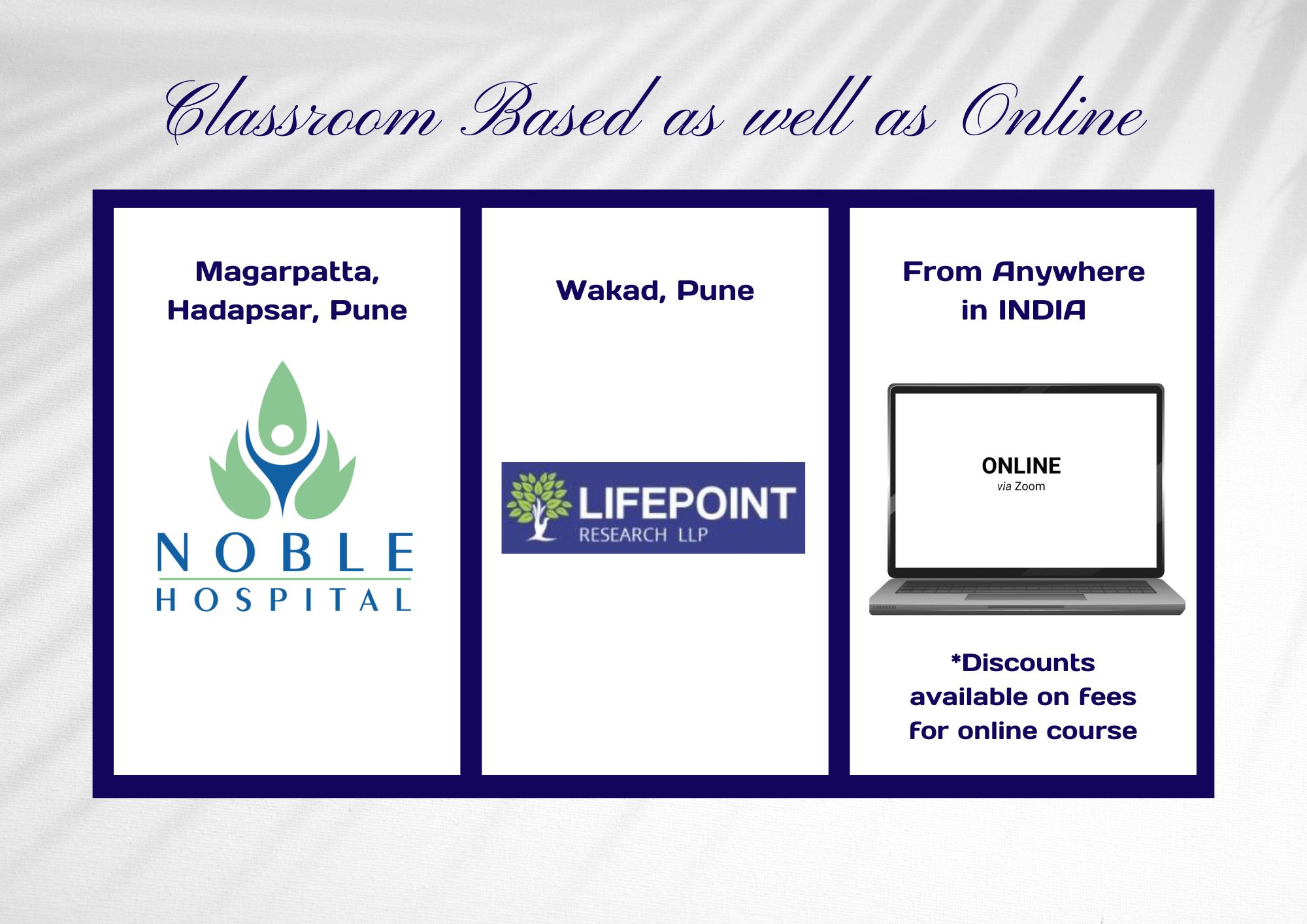
More Questions?
We are sure you have more questions in your mind
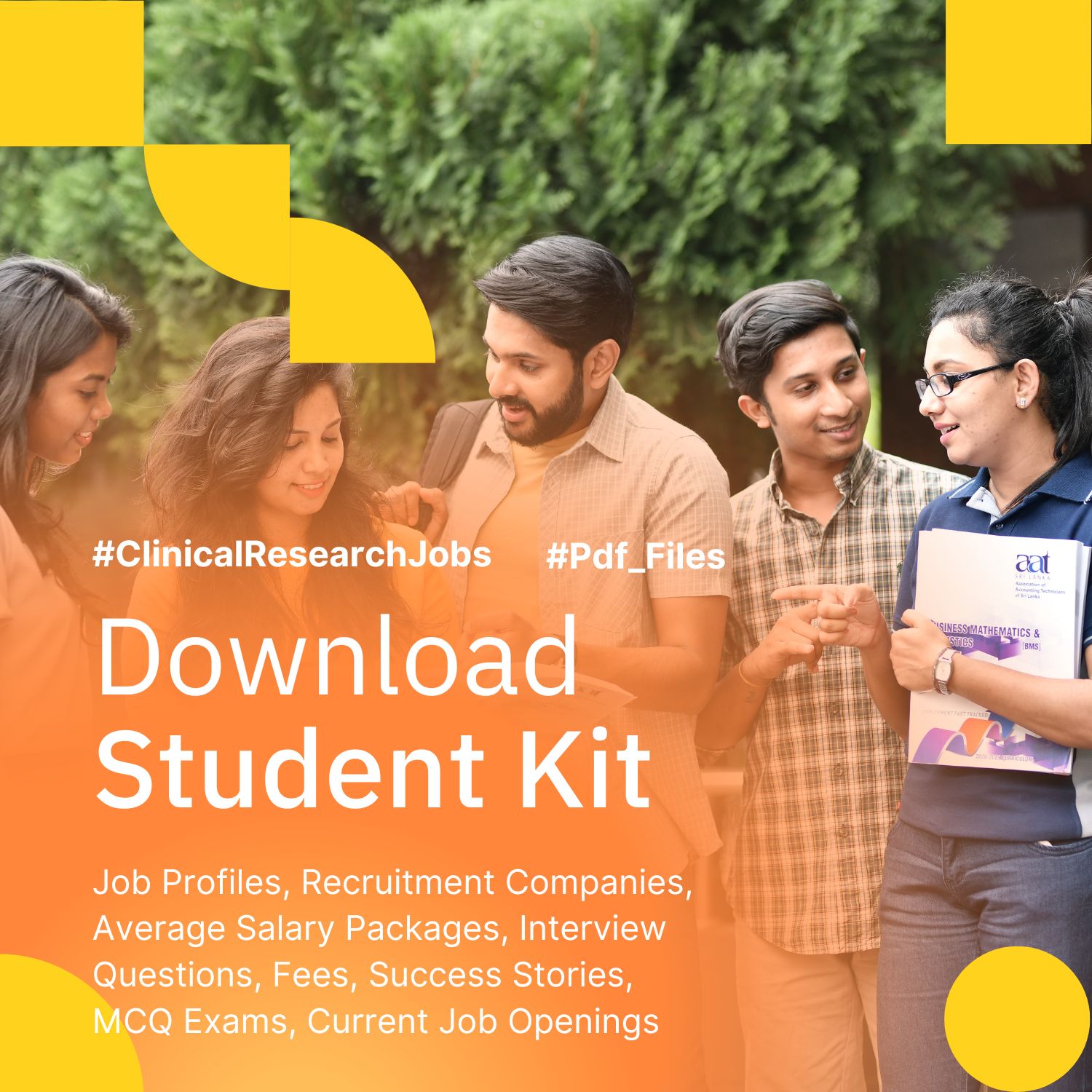

Clinical Research, Pharmacovigilance, Clinical Data Management
Knowledge Base

Career Paths in Regulatory Affairs
Regulatory affairs professionals are vital in gaining approval for new drugs. Explore roles like Regulatory Affairs Specialist and Compliance Officer, focusing on skill sets and career paths within regulatory frameworks.

Career Paths in Clinical Data Management
Data management roles in clinical trials are diverse, including Data Entry Associate, Data Manager, and Data Analyst. Learn about these roles, their impact on trial success, and the skills needed for each position.

Skills You Need to Succeed in Clinical Data Management
Clinical Data Managers need skills in data integrity, statistical analysis, and software like SAS and Oracle. This session covers essential skills for efficient data management, ensuring quality and compliance in clinical trials.
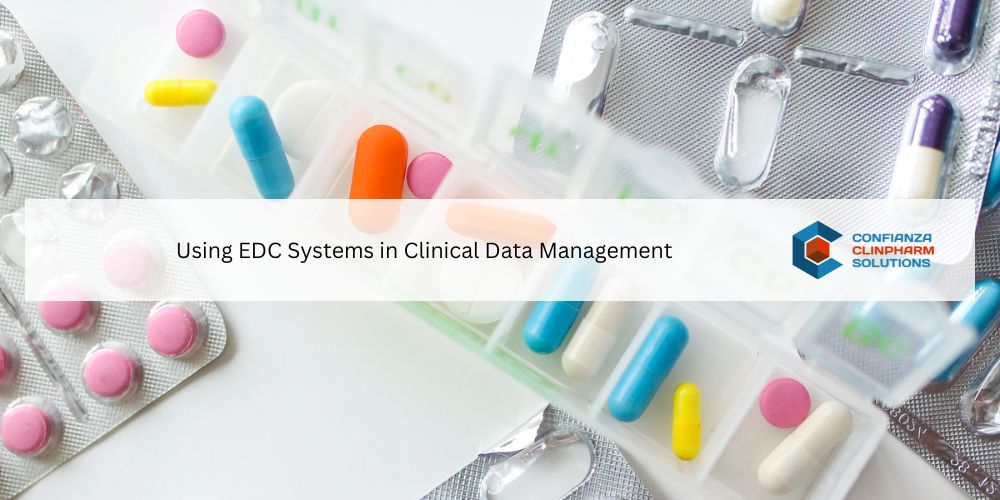
Using EDC Systems in Clinical Data Management
Electronic Data Capture (EDC) systems streamline data collection and reduce errors. Learn about EDC’s role in maintaining data quality and efficiency in clinical trials.
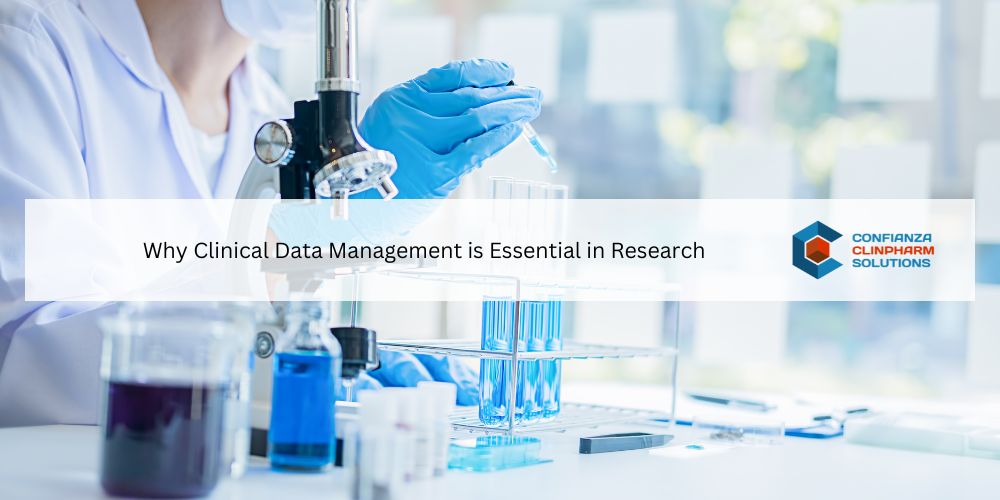
Why Clinical Data Management is Essential in Research
Clinical data management (CDM) ensures accurate, high-quality data collection and analysis, which is vital for the reliability of clinical trial outcomes. Learn how CDM contributes to evidence-based medicine and the development of new treatments.

Career Pathways in Clinical Research: Opportunities for Growth
The clinical research industry offers diverse career paths across pharmaceuticals, contract research organizations (CROs), and regulatory bodies. This update outlines roles like Clinical Research Associate (CRA), Data Manager, and Project Coordinator, each with unique growth opportunities and industry demand.
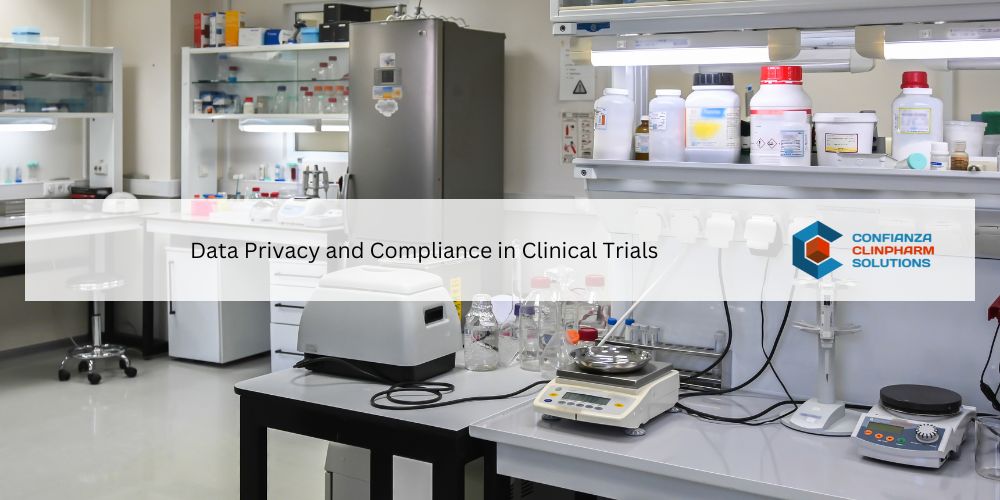
Data Privacy and Compliance in Clinical Trials
With sensitive health data, compliance with laws like GDPR is critical in clinical trials. Explore the importance of data privacy, ethical handling of personal data, and the regulatory frameworks governing data security.
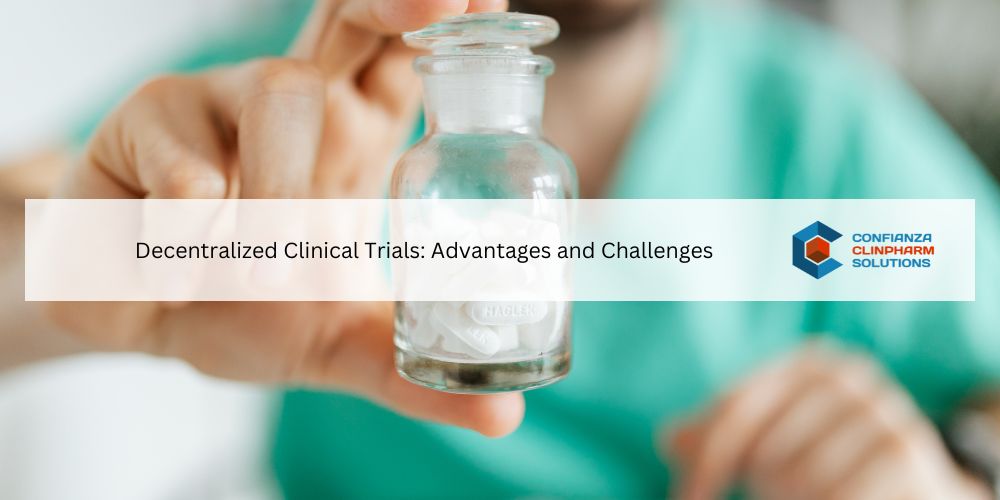
Decentralized Clinical Trials: Advantages and Challenges
Decentralized trials bring studies to patients through virtual visits and local labs. Explore the benefits, challenges, and technology behind decentralized trials, making clinical research more accessible.

Emerging Trends in Clinical Trial Designs
Adaptive trials, virtual trials, and decentralized trials are shaping clinical research. Learn how these innovative designs optimize trial efficiency, improve patient experiences, and reduce costs.

Ethics Committees and Their Role in Clinical Research
Ethics committees review and approve clinical trials to ensure participant safety. Learn about their role, responsibilities, and how they maintain ethical standards across clinical research practices.
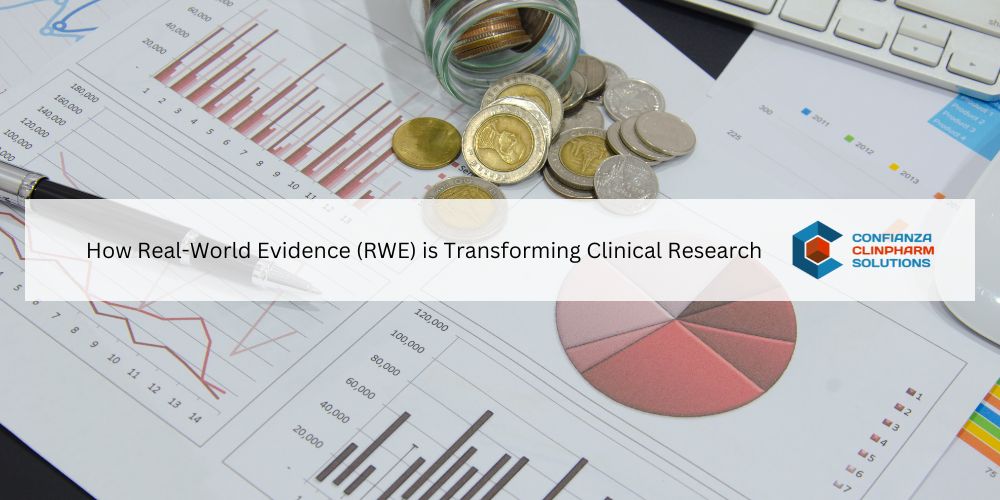
How Real-World Evidence (RWE) is Transforming Clinical Research
Real-World Evidence (RWE) provides insights into treatment effectiveness outside of controlled trials. Learn how RWE data from electronic health records and patient registries enhances decision-making in drug development and healthcare policies.
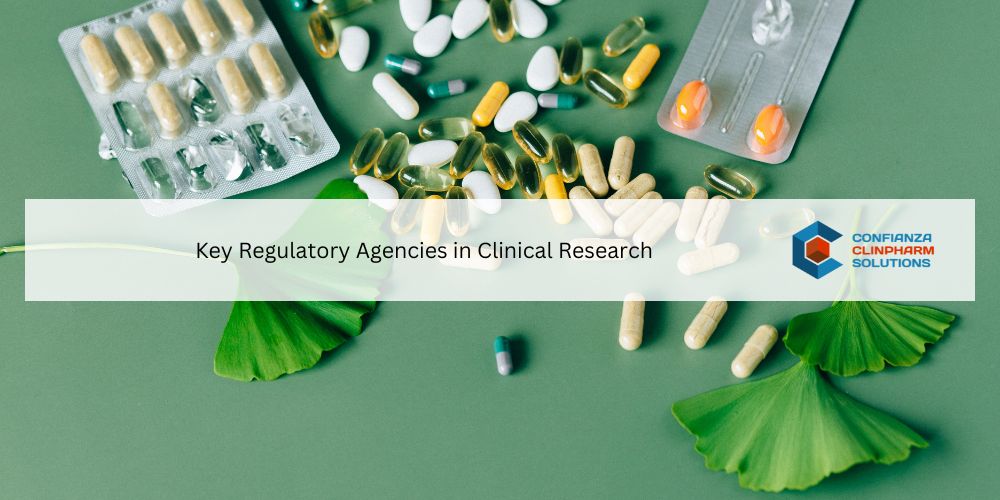
Key Regulatory Agencies in Clinical Research
FDA, EMA, and PMDA are primary regulatory bodies that oversee drug approvals. This topic covers their unique roles and how they impact the global drug development landscape.

Navigating Industry Regulations: Challenges and Solutions
Regulatory compliance is complex yet crucial in clinical research. This final session covers the challenges of meeting global regulatory standards and strategies for ensuring compliance across different regions.
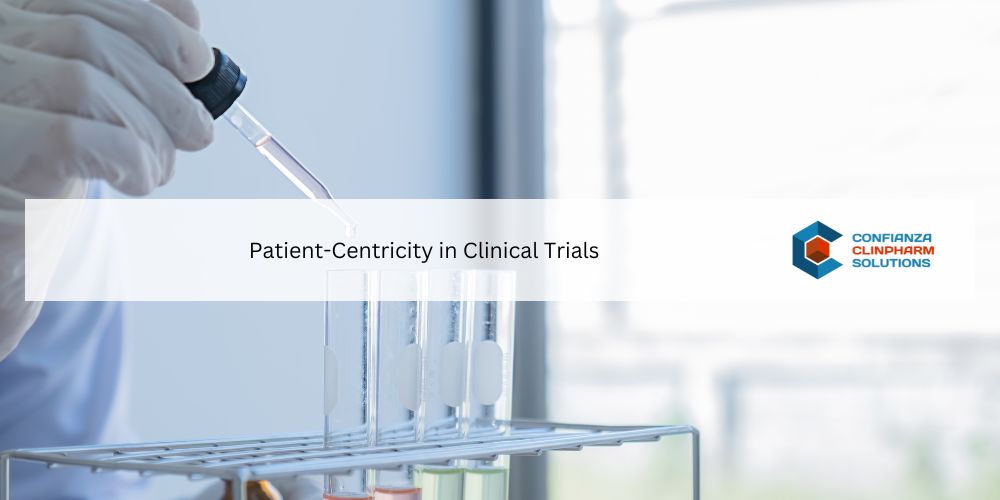
Patient-Centricity in Clinical Trials
Patient-centric trials focus on participant needs and engagement. Discover how patient involvement improves recruitment, retention, and trial outcomes, reflecting a shift towards more empathetic, inclusive research.
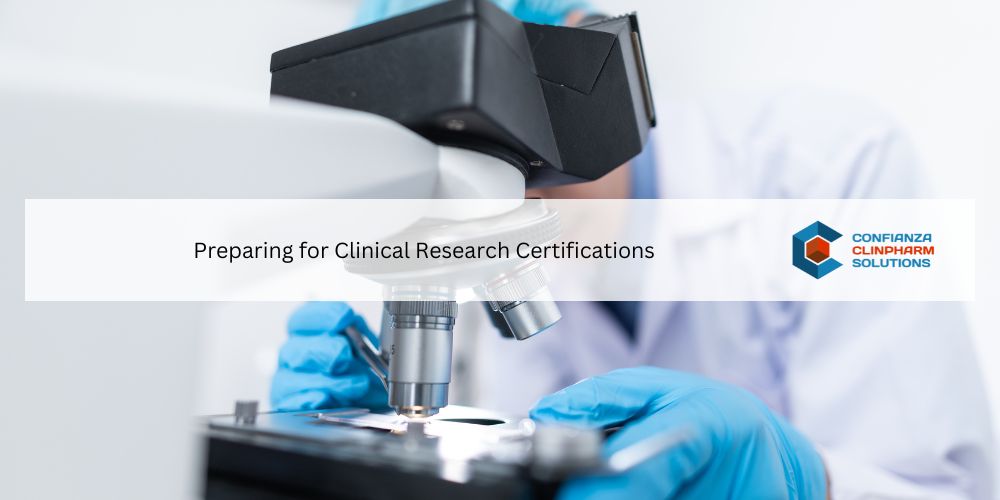
Preparing for Clinical Research Certifications
Certifications like CCRP (Certified Clinical Research Professional) enhance career prospects. This session guides on the value of certifications, their eligibility.requirements, and how they benefit a clinical research career.

The Evolution of Clinical Research with Technology
With AI, machine learning, and wearable tech, clinical research is becoming faster and more precise. Discover how digital advancements are revolutionizing trial designs, data collection, and patient monitoring, shaping the future of clinical research.

The Importance of SOPs in Clinical Research
Standard Operating Procedures (SOPs) ensure consistency and quality in clinical trials. Understand the significance of SOPs in maintaining regulatory compliance, safety, and data integrity.
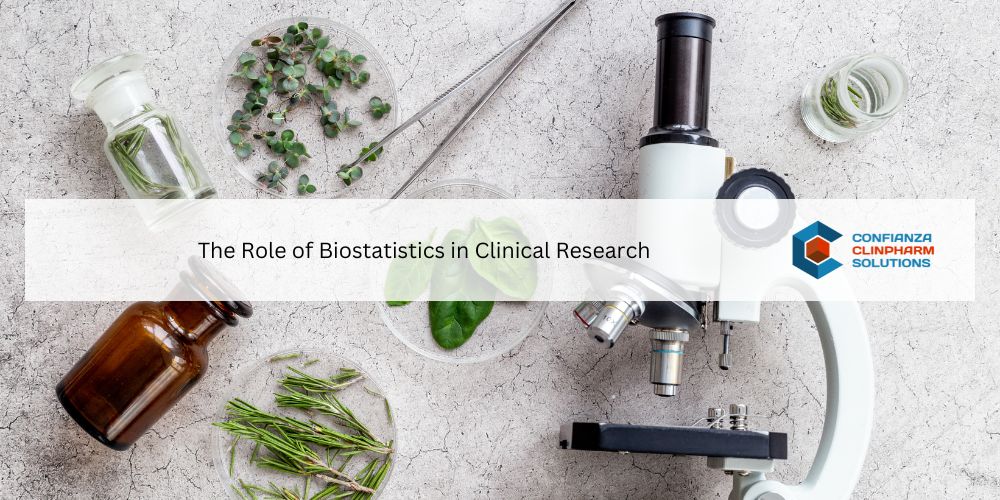
The Role of Biostatistics in Clinical Research
Biostatistics applies statistical techniques to analyze clinical trial data, ensuring accuracy and reliability. This session explores how biostatistics drives decision-making and risk assessment in drug development.
